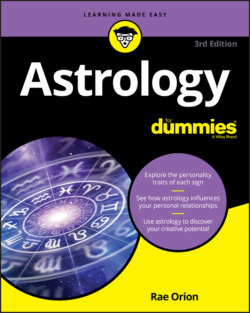Читать книгу Astrology For Dummies - Rae Orion - Страница 59
Saluting Modern Times
ОглавлениеWrenching change is what the nineteenth century was about. There were revolutions everywhere: wars of independence in Latin America, democratic revolutions in Europe, and in the United States, slavery, the Civil War, and the failed attempt at Reconstruction. There were astounding inventions — railroads, the telegraph, the electric light — and medical advances such as the first vaccines. Music, art, and literature flourished, and feminism arose at last. Early in the century, there was Romanticism, with its emphasis on emotion and its preference for the intuitive over the rational. Later in the century, there was Spiritualism, with its séances and otherworldly spirits, and a resurgence of interest in the occult. Amidst all that, astrology sprang to life.
One person responsible for its resurgence was an Englishman named William Frederick Allan, a Leo who renamed himself Alan Leo, it being the style among astrologers to adopt celestial or angelic pseudonyms. In 1890, Leo began publishing The Astrologer’s Magazine. A few years later, when he changed its name to Modern Astrology and began offering free horoscopes to subscribers, the magazine took off. The books he wrote — basic texts emphasizing the Sun — were widely read, by Carl G. Jung among others. Many are still in print.
In 1914, Leo was charged with fortune telling under the Witchcraft Act. Although he was acquitted on a technicality, he hoped to avoid future legal showdowns by focusing on psychological analysis and spiritual development rather than on prediction. Quoting Heraclitus, he wrote a brochure called Character is Destiny. And that is how Alan Leo became “the father of modern astrology.” Not that the authorities cared; in 1917, he was again accused of fortune telling, and this time he was convicted and fined. He died a month later.
In the United States, similar conflicts occurred, but at least once, the outcome was different. The astrologer in question was Evangeline Adams. In 1899, she checked into the fashionable Windsor Hotel in New York City in 1899, scrutinized the proprietor’s horoscope, and warned that he was in immediate danger. The next afternoon, his hotel went up in flames. Evangeline Adams never had to search for clients again. Working out of an office suite above Carnegie Hall, she counted among her clients Charlie Chaplin, Tallulah Bankhead, Joseph Campbell, and J. P. Morgan. “Millionaires don’t use astrology,” Morgan supposedly said (though evidence is scant). “Billionaires do.”
In 1914, the same year Alan Leo was first taken to court, Evangeline Adams was accused of fortune-telling. At her trial, to prove her expertise, she agreed to cast the chart of someone she did not know. The subject of that blind reading turned out to be the judge’s son. “The defendant raises astrology to the dignity of an exact science,” the judge announced, and she was acquitted. “I have Mars conjunct my natal Sun in the 12th house,” she said. “I will always triumph over my enemies.”
Astrology was becoming more visible and changing emphasis, becoming symbolic, psychological, and solar. Early in the twentieth century, the psychologist Carl Gustav Jung studied the mix of images, archetypes, and myths he found in astrology. To explain astrology’s power, he promoted the idea of synchronicity, an “acausal connecting principle” whereby seeming coincidences are resonant with meaning. It’s still a satisfying explanation in many ways. And although Jung tried without success to sell astrology to his mentor, Sigmund Freud, from whom he later broke, his astrological musings have done much to shape contemporary astrology.
